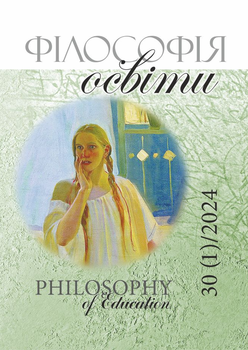Самовиховання і самоосвіта у професійному становленні українського громадянина
DOI:
https://doi.org/10.31874/2309-1606-2024-30-1-9Ключові слова:
самовиховання, самоосвіта, громадянський потенціал, самооцінка, громадянське виховання, миротворча освітаАнотація
Здійснюючи самовиховання та самоосвіту у процесі професійного розвитку, громадянин України має послуговуватись методиками й засобами самооцінки своїх переконань, знань, дій тощо. У цьому процесі важливою є адекватність здійснюваної самооцінки, її конструктивний, психологічно-позитивний та прагматичний характер. Кожна людина з дитинства має не лише формувати певну базову філософську культуру, яка допомагатиме їй досягати кращої самооцінки, але й прагнути постійно шукати для себе спільноту таких же зацікавлених у філософії. Ця спільнота філософської самоосвіти буде змінюватися протягом життя, однак, вона має постійно бути присутньою у житті людини – спільнота людей, які неформально цікавляться філософськими питаннями свого життя. Відзначається, що у вихованні громадянських якостей особистості особливу роль відіграють методи та технології самовиховання і самоосвіти, які молоді громадяни формують під час навчання та реалізують більшою мірою у дорослому житті, зокрема у професійному становленні українського громадянина. Здійснюючи професійну діяльність, людина повинна не тільки опановувати професійні навички, а й розширювати свій світоглядно-ціннісний, громадянський потенціал. У процесі професійного становлення громадянин має засвоїти принципи самовиховання та самоосвіти, які сформувались протягом усієї історії розвитку української культури. Наголошено, що самовиховання як феномен індивідуального буття неможливе без самоосвіти, яка базується на світоглядній позиції людини щодо важливості й необхідності оновлення власних знаннєвих компетенцій, зокрема й у сфері професійного становлення. Навички та методики самоосвіти, як правило, формуються під час навчання у шкільному й студентському середовищах. Також самоосвіта ґрунтується на здобутках української культури та науки, тих психолого-педагогічних стандартах, що склалися в нашій державі і є втіленням набутого колективного досвіду українського народу.
Посилання
Belenka, H. V. (2006). Educator of children of preschool age: becoming a specialist in the conditions of training: monograph. Kyiv: Svitych. [In Ukrainian].
Gardner, S. (2022). P4C and “Self-Education”: How can Philosophical Dialogue Best Solicit Selves? In: Mendonça, D. & Franken Figueiredo, F. (Eds). Conceptions of Childhood and Moral Education in Philosophy for Children. (Pp. 113-126). Stuttgart: Metzler.
Golovko, V. A. (2014). Self-education as a component of professional education and per¬sonality development in modern pedagogical scientific discourse. [In Ukrainian]. Pro¬ceedings. Series: Pedagogical and historical sciences / Ministry of Education and Sci¬ence of Ukraine, National Pedagogical Drahomanov University. Kyiv: Department of the NPDU. Vol. 117. C. 30-36.
Ivah, S. M. (2015). Professional self-education and self-development of future educators of preschool children in the conditions of universities. [In Ukrainian]. Scientific notes of the Department of Pedagogy, (34), 87-94.
Kolbina, L. A., & Pascal, O. V. (2021). Comprehension of the peace-making ideas of promi¬nent educators through a retrospective view of modern times. [In Ukrainian]. Innova¬tive pedagogy, 33(2), 31-35. https://doi.org/10.32843/2663-6085/2021/33-2.5
Kulakov, R. (2020). Development of empathy in children of primary school age in the con¬ditions of the educational process. [In Ukrainian]. Psychology: reality and prospects. Collection of scientific works of RDSU, (15), 91-96. https://doi.org/10.35619/praprv. v1i15.189
Ma, S., Liu, S., Ma, L., Liu, C., Lu, J., & Wang, J. (2023). Philosophy of self-learning educa¬tion implemented in a virtual education system. Learning and Motivation, 84, 101916. https://doi.org/10.1016/j.lmot.2023.101916.
Malý, L. (2023). The Role of Educational Programmes and Their Effect on Self-Education: An Example from Practice in the Context of Encountering Different Cultural Influenc¬es. Theology and Philosophy of Education, 2(2), 25–31. https://tape.academy/index. php/tape/article/view/31
Onkovych, H. V. (ed.) (2012). Theoretical and methodological principles of integration of the content of humanitarian education in higher educational institutions of a non-hu¬manitarian profile: Monograph. Kyiv: Pedagogical thought.
Oprea, I. M. (2021). Self-education and lifelong learning. Proceedings of INTCESS 2021 8th International Conference on Education and. Education of Social Sciences. 18–19 January. P. 142-145. https://doi.org/10.51508/intcess.2021157.
Paguta, T. I. (1997). Cooperation of preschool educators with the family on education of preschoolers in the spirit of peace: authoref. thesis ... candidate of pedagogical scienc¬es. Kyiv: Institute of Pedagogy of the National Academy of Educational Sciences of Ukraine. [In Ukrainian].
Riabovol, T. A. (2014). Socio-psychological factors in the development of empathy in ju¬nior high school students of general educational institutions. [In Ukrainian]. A young scientist, 3(06), 97-100.
Sharnenkova, T. O. (2017). Organization of teacher self-education in domestic theory and practice (end of the 19th – first third of the 20th century): diss. ... candidate ped. of science Zhytomyr: Zhytomyr Ivan Franko State University. [In Ukrainian].
Shcherbak, O. (2015). Psychological and pedagogical principles of professional development and self-development of a teacher of professional training. [In Ukrainian]. In: Kremen, V. G., Dmytrychenko M. F., & Nychkalo, N. G. (Eds.). Conceptual principles of professional development of the individual in the conditions of European integration processes: collection of scientific articles. (Pp. 472-482). Kyiv: NTU.
Stadnyk, M. M., & Panchenko, A.G. (2020). Actualities of peacekeeping education. [In Ukrai¬nian]. Electronic magazine “Public administration: improvement and development”. (2), 1-5. https://doi.org/10.32702/2307-2156-2020.2.4
Suprun, M. O. (2014). Self-education of the personality of the future specialist in the field of public administration (theoretical-practical aspect). [In Ukrainian]. Public administration: theory and practice, (1), 114-124.
Tikholoz, V. V. (2016). Methodical aspect of the course “Self-education and self-regulation of personality” in the training of specialists in the social sphere. [In Ukrainian]. Bul¬letin of Cherkasy University. Series “Pedagogical Sciences”, (8), 115-121.
Yavorska, T. (2015). Socio-historical prerequisites for the development of self-education activity of the individual: theoretical aspect. [In Ukrainian]. Origins of pedagogical skills, (15), 359-364.
##submission.downloads##
-
PDF
Завантажень: 372
Опубліковано
Як цитувати
Номер
Розділ
Ліцензія

Ця робота ліцензується відповідно до Creative Commons Attribution 4.0 International License.
- Автори, які публікуються у цьому журналі, згодні з такими умовами:
- Автори зберігають авторське право і надають журналу право першої публікації;
- Автори можуть укладати окремі, додаткові договірні угоди з неексклюзивного поширення опублікованої журналом версії статті (наприклад, розмістити її в інститутському репозиторії або опублікувати її в книзі), з визнанням її первісної публікації в цьому журналі.





